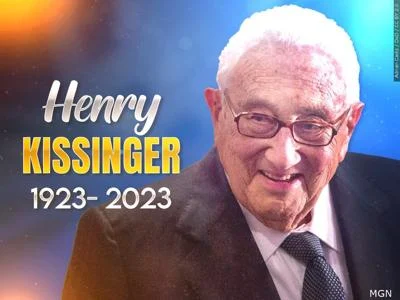At the ripe age of 100 years, Henry Alfred Kissinger, former United States diplomat and Secretary of State who served under Presidents Richard Nixon and Gerald Ford between 1969 and 1977 as National Security Adviser and Secretary of State, respectively, died in his home on Wednesday, November 29, 2023, in Kent, Connecticut in the United States.
He was born Heinz (anglicised to Henry) Alfred Kissinger in Fuerth, Bavaria, Germany in 1923. His family fled Germany at the height of the Nazi regime to the US and remained a refugee and stateless until 1935 when he gained full citizenship. He thereafter enlisted in the American Army in 1943 and fought in the Second World War.
At the end of the war, he enrolled at the City University of New York to study Political Science and went on to Harvard University for further studies. He was subsequently retained in Harvard teaching and rising to professorship in the same discipline from where he was headhunted by the Nixon administration to be National Security Adviser.
Kissinger was much celebrated in America and the West for his efforts in helping to initiate the rapprochement between the US and China and in pursuit of détente with the Soviet Union at the height of the ideological struggle between the Communist and Capitalist camps. But in Africa, the Middle East, much of Asia and Latin America, opinions about him are not so favourable. In the global south, he is much regarded as the unacceptable face of America’s imperialist policies which brought much death, pain and suffering to thousands of people in many countries.
- Troops nab IPOB/ESN commander in Enugu, recover arms, ammunition
- Fubara signs 2024 budget into law, 24hrs after presentation
In Asia, he was condemned for his approval of the carpet bombing of Cambodia during the Vietnam War in which about 50,000 people mostly women, children and the aged were killed under the unconvincing reason that Cambodia was a conduit of supplies and sanctuary for the North Vietnamese forces fighting the Americans in Vietnam.
Despite his controversial role in the Vietnam War, Kissinger was curiously awarded the Nobel Prize for Peace for his efforts in ending the Vietnam War along with the Cambodian leader Le Duc Tho which was widely condemned as undeserving.
Nigerians will also not forget that at the peak of the liberation struggles in Southern Africa during the military regime of General Murtala Muhammed, Kissinger as American Secretary of State sought to dissuade Nigeria from supporting the liberation movements.
The Nigerian government at the time supported the liberation movements from the prism of a struggle for independence for which as a former colony itself and the most populous African country, it owed an obligation to support. Pointedly the Murtala Muhammed-led Nigerian military government refused to accept Kissinger’s request to come to Nigeria to parley on the issue, particularly in Angola, where Nigeria was then supporting the Popular Movement for the Liberation of Angola (MPLA) against its Western-backed opponents, the National Front for the Liberation of Angola (FNLA) and the United Front for the Total Liberation of Angola (UNITA). Kissinger until then was never so demystified in his entire diplomatic career.
But perhaps it was in the Middle East that Kissinger’s negative footprints in pursuit of America’s foreign policy were clearly exhibited. It is a fact well known around the world that America had never been an honest broker in the intractable Arab-Israeli conflict owing mainly to the overbearing influence of the powerful and influential Jewish lobby in the US. As a prominent American Jew with Zionist leanings, Kissinger’s support for Israeli aggressive policies towards neighbouring Arab states and its denial of UN-sanctioned Palestinian statehood was obvious. In this wise, during the Yom Kippur war between Egypt and Israel in 1973, he intervened on the side of the Israelis as they faced imminent defeat from the Egyptian forces which forced a stalemate in the war.
This set the stage for an eventual one-sided peace treaty between Egypt and Israel in 1977 in Camp David, USA. In essence, the Camp David treaty effectively detached Egypt, the most powerful Arab country, from providing leadership to the Arab cause and especially in pursuing the issue of Palestinian statehood to a successful end.
It is fitting to point out that Kissinger left the world at a time when Israel is presently engaged in a war against the Palestinian people with the declared intention of wiping them all out of their land. As a refugee himself fleeing from Nazi Jewish persecution in Germany, Kissinger may have long forgotten this, but the image of thousands of Palestinian children, women and the aged brutally murdered by Israeli forces and the thousands more people around the world whom he caused to be killed will no doubt register in his conscience and form an appropriate epitaph on his journey to meet his maker.

 Join Daily Trust WhatsApp Community For Quick Access To News and Happenings Around You.
Join Daily Trust WhatsApp Community For Quick Access To News and Happenings Around You.